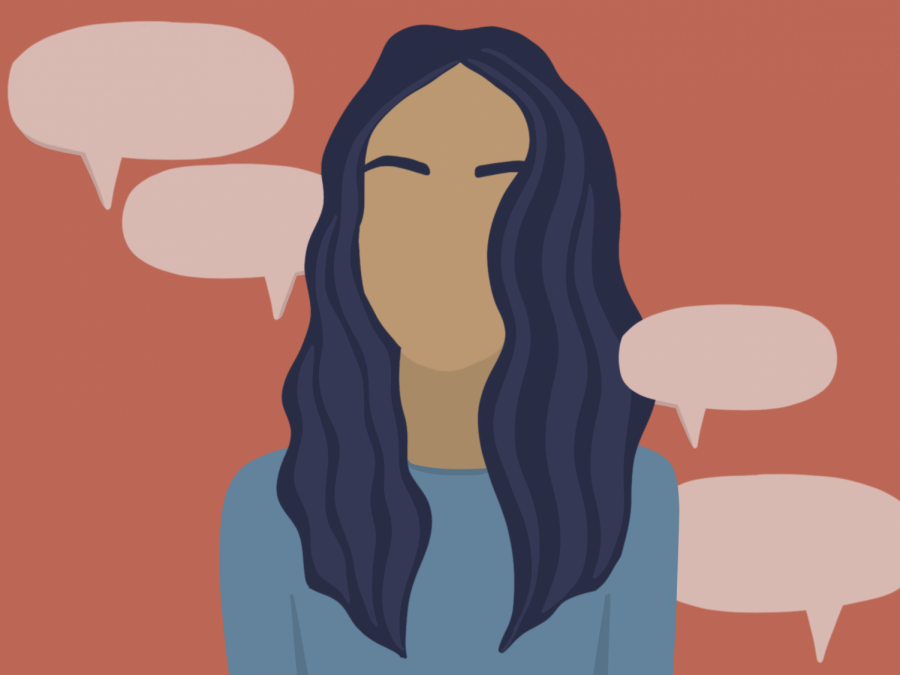Opinion | Stop shaming women for what they do to their face
February 15, 2021
During his Super Bowl halftime performance last week, The Weeknd surrounded himself with an army of backup dancers whose faces were covered in bandages. These bandaged faces have been a common theme in many of the artist’s performances and music videos throughout last year. After widespread speculation from fans on what the message of this theme was, The Weeknd explained the meaning behind his performance in an interview.
“The significance of the entire head bandages is reflecting on the absurd culture of Hollywood celebrity and people manipulating themselves for superficial reasons to please and be validated,” The Weeknd said.
There definitely is a problem with our society being hyper-focused on people’s looks, but the Weeknd is highlighting the wrong aspect of the issue. He places the blame on people who are conforming to our societal beauty standards when the blame should be placed on the beauty standards themselves. The Weeknd is not alone in thinking this — a survey showed that 63% of men felt that women wear makeup solely to trick men into thinking they are more attractive. These narratives that shame people, mostly women, are problematic for a variety of reasons.
First of all, the idea that all women who change or enhance something about themselves are doing it for validation is deeply misogynistic. It perpetuates the idea that women’s actions are for male approval and not for themselves. Additionally, a study by Harvard Medical School found that wearing makeup boosts an individual’s confidence and self-esteem, which leads to increased cognitive abilities.
In fact, the majority of women who wear makeup or get plastic surgery do so for a sense of self-empowerment, but that still does not mean we should shame the women who might be seeking validation. Pretty privilege is a very real thing in our society. Whether it is being more likely to get hired or receiving higher salaries, numerous studies have revealed that being considered “attractive” comes with many advantages. Science has shown us that “good looks” will be rewarded, as society favors those who are attractive. Therefore, it is ridiculous to shame women for trying to achieve certain beauty standards.
In general, it seems like women cannot win when it comes to beauty standards in our society. Either women are punished for not naturally fitting beauty standards, or we are shamed for trying to conform to them. The experiences of successful singer Iggy Azalea and former CEO of Hewlett-Packard, Carly Fiorina, regarding their looks provide a perfect example of the catch-22 that women often face. After getting a nose job, Azalea expressed her irritation at the constant criticism and attention to her plastic surgery.
“For how long do we have to acknowledge that I got a nose job? For the rest of my life?” Azalea asked.
Instead of giving attention to her multiple Grammy nominations and Billboard Music Awards, the media chose to focus on her nose. On the other hand, Fiorina faced rude remarks about her looks from former President Donald Trump, who was one of her opponents in the 2016 Republican primaries.
“Can you imagine that, the face of our next president? I mean, she’s a woman, and I’m not supposed to say bad things, but really, folks, come on,” Trump said in an interview.
Instead of focusing on Fiorina’s policies, Trump attacked her physical appearance. While these examples show that women are shamed for their looks regardless of whether they are natural or not, they also point to the larger issues that beauty standards create in our society. Azalea and Fiorina are both extremely accomplished women, but rather than having a discussion surrounding their knowledge and expertise, the discussion was reduced to their looks.
Another issue with beauty standards, specifically in the United States, is that they are very exclusive. Being thin, blonde and blue-eyed is considered to be the epitome of beauty in our country, but a majority of American women do not fit these standards. Additionally, features such as straight hair and small noses are considered more desirable, which comes from the Eurocentric standard of beauty that often excludes people of color. We are constantly fed this picture of beauty in movies, TV shows and social media posts, so, understandably, women feel pressured to fit into them.
Women are not only expected to fit beauty standards, but they are also expected to keep up with the constant shifts in beauty trends. What is coveted in one decade may become not so desirable in another, or vice versa. A good example of this is the current trend of having big lips. In 2010, modeling agent Justin Peery gave his opinion of certain features to a short documentary film.
“When [a model] comes in with big eyes, big nose, big lips … Things that are common traits in African-Americans — it doesn’t work,” Peery said.
For decades, women of color were shamed for having bigger lips, which they possessed naturally. Now, because of social media trends, the procedure of getting one’s lips filled has seen a 50% increase since 2000.
There has been a lot of positive progress when it comes to the issue of beauty standards in our society. Movements like Black is Beautiful and body positivity have helped to make beauty a more inclusive concept in our country. When talking about the issue of beauty standards, focusing on positive movements such as these would be a far more effective narrative than shaming women for plastic surgery or makeup.
Generally, I think a good rule of thumb for everyone to follow is to stop worrying about other people’s faces.
Nithya writes about politics for The Pitt News. Write to her at [email protected].








